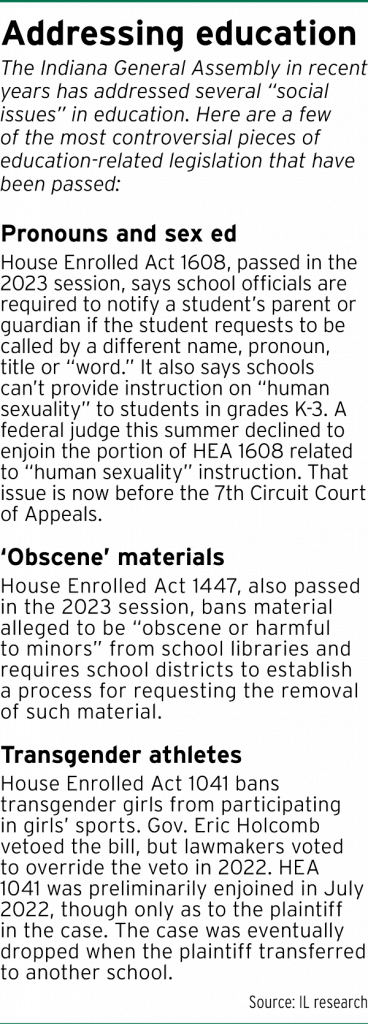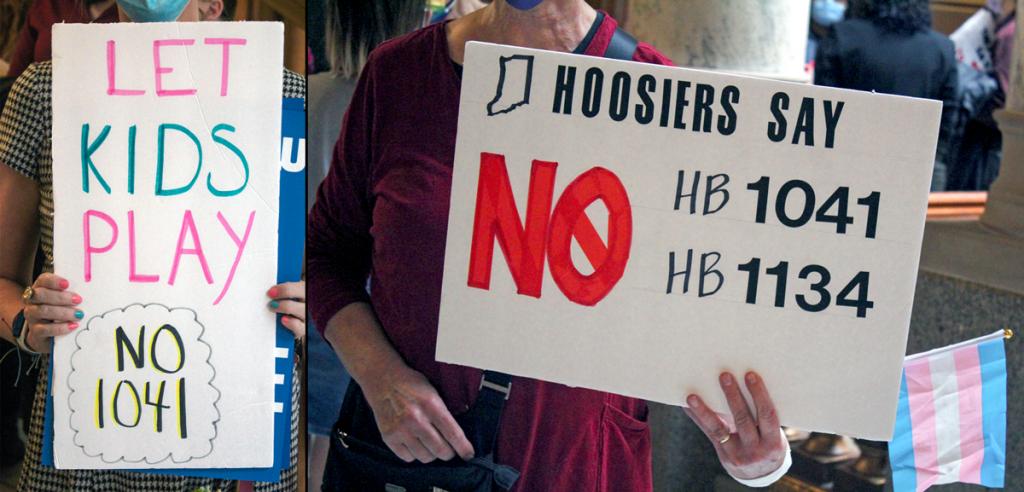Subscriber Benefit
As a subscriber you can listen to articles at work, in the car, or while you work out. Subscribe NowIf the last few legislative sessions are any indication of what could be on the horizon for the Indiana General Assembly in 2024, one seemingly safe bet is that the state’s lawmakers will again take up controversial education policy.

From pronouns to “obscene” reading material to transgender athletes, recent education legislation has created fierce debates — and experts don’t expect that to go away soon.
Greg Shufeldt, an associate professor in the Department of History and Political Science at the University of Indianapolis, said those types of policies are “wedge issues.” Another phrase that often comes up: “culture wars.”
Shufeldt studies how national trends manifest themselves in state and local government.
“Most education policies derive from other states,” he said. “Very few laws are in response to the on-the-ground reality in a given state.”
 Aside from other states, Shufeldt pointed to organizations that, in Indiana’s case, include conservative stalwarts such as the American Legislative Exchange Council and Moms for Liberty. Their policy ideas, he said, tend to “diffuse across states.”
Aside from other states, Shufeldt pointed to organizations that, in Indiana’s case, include conservative stalwarts such as the American Legislative Exchange Council and Moms for Liberty. Their policy ideas, he said, tend to “diffuse across states.”
What could be next for Indiana?
One popular pick for contentious education legislation that could find its way to Indiana in the next legislative session has to do with Advanced Placement courses.
In February, the New York Times reported Florida Gov. Ron DeSantis — now a Republican presidential candidate — said he would ban curriculum in AP African American Studies because it violated the state’s new “Stop Woke Act.”
The College Board, which administers the SATs and AP courses, responded by removing some of the curriculum, including the names of Black writers and scholars associated with critical race theory.
Now, new African American history standards in Florida include language about how “slaves developed skills which, in some instances, could be applied for their personal benefit,” NBC News reported in July.
Republican lawmakers in Indiana took up a bill targeting critical race theory in 2022, though it ultimately failed.
Indiana Senate Minority Leader Greg Taylor, D-Indianapolis, said to “look and see” what’s happening in states like Florida and Tennessee for a preview of what may travel north to Indiana.

Indiana’s priorities, Taylor said, should be on addressing issues such as the teacher shortage and student achievement. About 30% of students in grades 3-8 scored proficient or better in both the English and math sections of the state’s ILEARN test, Chalkbeat Indiana reported in July.
“I think our priorities have been in the wrong place,” Taylor said.
Indiana Lawyer reached out to Republican lawmakers for comment on this article but did not receive a response.
Aside from legislation tackling new issues, Shufeldt said another possibility is that the Legislature will double back to other recently passed laws to either try to clear up confusion or make them stronger.
For example, issues concerning transgender students could come up again.
Last year, the Indiana General Assembly passed House Enrolled Act 1041, which bans transgender girls from participating in K-12 girls’ sports. Republican Gov. Eric Holcomb vetoed the bill, but the Republican supermajority later voted to override the veto.
The American Civil Liberties Union of Indiana filed a federal lawsuit challenging the law on behalf of a 10-year-old transgender girl. The Indiana Southern District Court issued a preliminary injunction to allow the girl to play on a school team, but the injunction applied to the girl only.

Indiana Attorney General Todd Rokita requested that the 7th Circuit Court of Appeals hear the case en banc, but that request was denied. Rokita then asked the appellate court to lift the preliminary injunction.
The case has since been dismissed.
Also related to transgender students, the attorney general has thrown his support behind the Metropolitan School District of Martinsville, which is appealing to the U.S. Supreme Court after the 7th Circuit declined to reverse preliminary injunctions against two school districts, upholding orders for the districts to allow transgender students to use the boys’ bathrooms.
“Nothing in the U.S. Constitution, Title IX or any other federal law requires schools to have coed bathrooms, locker rooms and showers, which pose a direct threat to the health, privacy, safety and security of our children,” Rokita said in a statement on Aug. 24. “Accordingly, federal courts should never mandate that boys and girls must be able to use the same school bathrooms depending on gender identity.”
Rokita encouraged the Vigo County School Corporation — the other district involved in the preliminary injunction — to do the same.
“As legal actions proceed,” the statement continued, “my office and I will continue working boldly on the side of Hoosier families and school officials by advocating for the safe and sensible policy of protecting our children with single-sex bathrooms.”
Why the changes?

Sheila Kennedy, a former director of the Indiana Civil Liberties Union, has a theory about why legislation having to do with books and pronouns have been centerpieces in education policy recently.
America is changing, Kennedy said, so now, older people are looking around at a world they don’t recognize and they’re “terrified,” she opined.
“These folks are losing social dominance, and they are furious and angry,” said Kennedy, who is now professor emeritus at the O’Neill School of Public and Environmental Affairs at IUPUI.
Kennedy, who in 1980 was the Republican candidate for Indiana’s then-11th Congressional District seat, said the GOP of today has moved further right.
“What our Legislature has done to public education is tragic,” she said, adding that she believes “cracks under the surface” of the party that could prevent some of the more contentious proposals getting through the Legislature.
But as for a prediction of what proposals may come in 2024?
“Who could tell what they’re going to do next?” Kennedy said.•
Please enable JavaScript to view this content.

